人教版九年级英语Unit11单词、课文mp3 知识梳理 词汇句式精讲
人教版英语九年级词汇精讲——Unit11

Unit 11 Sad movies make me cry.1.rather adv. 相当,相反(近义词:pretty / quite相当)would rather (’d rather) 宁愿rather than 而不是(=instead of)would rather do sth. than do sth.=prefer to do sth. rather than do sth.宁愿做...也不愿做...or rather 更确切地说,倒不如说rather too 稍微...一点2.drive v. 迫使(近义词:force)drive/force sb. to do sth. 迫使某人做某事(尤指不好的事)e.g. Hunger drove him to steal. 饥饿迫使他去偷窃。
drive sb. crazy/mad 使某人发疯/发狂v. 驾驶、开车(drove - driven)driver n. 驾驶员drive相关短语3.the more...the more...越...越...the +比较级...,the+比较级... 越...越...e.g. The more you read, the more you know.区别:比较级and 比较级/ more and more +原级越来越...e.g. Our city is becoming more and more beautiful.tely adv. 最近,不久前(recently)辨析:lately, latest, later, lateI have received a letter from her lately. 最近我收到了她的一封信。
This is the latest song. 这是最新的歌曲。
She arrived in New York on Sunday. Two days later, she left for London.她星期日到达了纽约。
九年级英语全册Unit11Sadmoviesmakemecry知识点汇总新版人教新目标版

侧重看质量、水平等是否过关
10.neither...nor
既不……也不……
就近原那么
eg:Neither he nor I am well educated
在三天的时间里
“in+一段时间〞常用于将来时态
eg: It is about 20 minutes' bus ride from my home to school
n.重量
常用短语
put on weight 体重增加;长胖
lose weight 减肥
3.let...down
使……失望
动词+ห้องสมุดไป่ตู้词
宾语是人称代词时,放在两词间
let短语
let out 下课;散会
let alone 不打搅
let in 允许进入
let through 允许……通过
4.kick sb. off
辨析
even though
引导的从句内容是真实的
尽管,虽然
eg:Even though it's hard work, I enjoy it.
even if
引导的从句是假设性的
即使,就算,哪怕
eg:They'll stand by you even if you don't succeed.
2.weight
开除某人
eg: The boss kicked him off last week.
kick短语
kick on 开始工作
kick down 踢倒
kick against对抗
kick back 踢回,还击
5.be(too) hard on sb.
九年级英语知识点Unit11

九年级英语知识点Unit11Unit 11: English Grammar for 9th GradersIntroduction:In 9th grade English, students will encounter various important grammar concepts that will help them enhance their understanding and usage of the English language. This unit will focus on key knowledge points that students need to grasp to improve their language skills. Below are the crucial topics covered in Unit 11:1. Verb Tenses:Verb tenses play a significant role in expressing time and indicating the sequence of events. Here, we will discuss the four main verb tenses: Present, Past, Future, and Present Perfect. Each tense has its own rules and usage, and this section will provide a thorough explanation of each tense, examples, and exercises for better understanding.2. Passive Voice:The passive voice is frequently used in English to emphasize the action or the object rather than the subject performing the action. In this section, we will explore the formation and usage of passive voicesentences, including the conversion of active voice sentences to passive voice and vice versa.3. Conditionals:Conditionals are sentences that express consequences or hypothetical situations. There are four types of conditionals: zero, first, second, and third conditional. We will delve into each conditional type, explaining the structure, usage, and providing examples to clarify how they are employed in conversations and writing.4. Reported Speech:Reported speech is used to convey someone else's words in indirect form. In this section, we will focus on transforming direct speech into reported speech, including changes in verb tenses, pronouns, and time expressions. Extensive examples and exercises will help students practice and master this important skill.5. Modals:Modals are auxiliary verbs used to express various meanings such as ability, possibility, necessity, and permission. This section will discuss the different modals, their usage, and how they can be appliedin different contexts. Students will also have the opportunity to practice using modals in sentences to solidify their understanding.6. Question Forms and Tags:Asking questions and using question tags are essential skills for effective communication. This section will cover different question forms (Wh-questions, Yes/No questions, and alternative questions) as well as question tags. Students will learn how to correctly construct questions and tags, using appropriate word order and intonation.Conclusion:Unit 11 of the 9th-grade English curriculum covers crucial grammar knowledge points to strengthen students' understanding and application of the English language. Mastery of these concepts will enhance their overall proficiency and enable them to communicate effectively in both spoken and written English. It is important for students to practice these grammar skills regularly and seek further guidance when needed to solidify their knowledge.。
九年级上册Unit11单词音标大声朗读PPT

汉语 意思
n.勇气;勇敢
单词 rather than
汉语 意思
而不是
音标 [ɡaɪ]
单词 guy
汉语 意思
n.男人;小伙子
音标 [pʊl]
单词 pull
汉语 意思
v.拉;拽;扯
单词 pull together
汉语 意思
齐心协力
音标 [rɪˈliːf]
单词 relief
汉语 n.(不快过后的)宽慰, 意思 轻松
音标 [praɪm]
单词 prime
汉语 意思
adj.主要的;首要的
音标 [ˈmɪnɪstə(r)]
单词 minister
汉语 n.(英国及其他许多国家 意思 的)部长,大臣
单词 prime minister
汉语 n.首相;总理
意思
音标 [ˈbæŋkə(r)]
单词 banker
汉语 n.银行老板(或要员); 意思 银行家
九年级英语上册单词
第11单元 大声跟读、快速记忆
Unit 11
音标 [ˈrɑːðə(r) ]
单词
汉语 意思
rather
adv.(常用于表示轻微的批评、 失望或惊讶)相当,在某种程度上
音标 [wʊd ˈrɑːðə(r)]
单词 would rather
汉语 意思
宁愿
音标 [draɪv]
单词 drive
音标 [nɒd]
单词 nod
汉语 意思
v.点头;点头致
音标 [əˈɡriːmənt]
单词 agreement
汉语 意思
n.协定;协议;契约
音标 [fɔːlt]
单词 fault
汉语 意思
人教版九年级英语unit11同步课文讲解PPT课件(共50页)

is getting hotter and hotter.
Our hometown is becoming more and more beautiful.
6. Why don’t +sb.+do sth.? = Why not + do sth.? 为何不……? 用来提出建议或劝告。
课中检测一 1. He _________(宁愿) stay at home than see the movie. 2. The noise______________. (使我发疯) 3. __________ (越多) you learn, _______________(越聪明) you are. 4. My brother is always_________________( 被忽略)because he is shy.
2) “leave sth.+地点状语”: “把某物遗忘在 某地"。
e.g. I left my homework at home. 我把作业忘在了家里。
1. 一直等她让我很生气。 2. 我宁愿待在家里也不愿去公园。 3. 为什么不去看电影呢? 4. 汶川在2008年发生了一场大地震。 5. 我们在一起越多,我们就越开心。
Kick sb off
pull together
rather than
Be hard on sb
drive examine kick pull disappoint power banker
palace wealth grey uncomfortable fame coach besides courage relief nod Fault agreement
Unit11笔记人教版英语九年级全册

Unit 11 知识梳理总结【词汇梳理】drive(v.迫使)→ drove(过去式)→driven(过去分词)→drive sb. crazy/mad使某人发疯/发狂friend(n.朋友)→friendly(adj.友好的)→friendship(n.友谊;友情)bank(n.银行;岸)→banker(n.银行家)examine(v.检查;检验)→examination(n.考试)wealth(n.财富)→wealthy(adj.富有的)weigh(v.称重)→weight(n.重量;分量)pull(v.拉;拖)→push(v.推)power(n.权利;力量)→powerful(adj.有权势的;有影响力的)wealth(n.财富)→wealthy(adj.富裕的)→be wealthy in在......方面富有nod(v.点头)→nodding(现在分词)→nodded(过去分词)agree(v.同意;看法或意见一致)→ agreement(n.)→ disagree(v.反义词:不同意)→ in agreement意见一致disappoint(v.使失望)→ disappointed (adj.失望的)→ disappointing(adj. 令人失望的)→ fort (v.使舒服)→ fortable (adj.使人舒服的)→ fortably (adv. 使人舒服地)→ unfortable (adj.不舒服的)【短语归纳】would rather宁愿the more... the more... 越......就越......have...in mon 有......共同之处leave out忽略,不包括feel like doing sth. 想要做某事call in召来;叫来take one’s position 取代某人的位置hand back归还search for搜寻;查找let...down使......失望kick sb. off开除某人be hard on sb. 对某人苛刻;对某人要求严格pull together齐心协力,通力合作rather than而不是start with=begin with以......开始clean up清扫干净【考点总结】1.I’d rather go to Blue Ocean because I like to listen to quiet music while I’m eating.(该句中,because引导原因状语从句,从句中又包含了一个while引导的时间状语从句)①would rather (not)do sth. 宁愿(不)做某事e.g. I would rather listen to classical music.②would rather do sth. than do sth.=would do sth. rather than do sth.=prefer to do sth. rather than do sth.e.g. I would rather stay at home than go out.=I would stay at home rather than go out.=I prefer to stay at home than go out.2.while conj.当......的时候e.g. While my father was reading a book, my mother was cooking.She was playing the piano when Mary left.3.But that music makes me sleepy.4.so...that... 如此......以至于......e.g. The little boy is so scared that he can’t say anything.He is such a friendly teacher that every student like him.【注1】(高频考点)too...to...意为“太......而不能....”(too+adj./adv.+ to + v.),常与so...that...句型(so++adj./adv +that句子)互换。
九年级英语全册Unit11Sadmoviesmakemecry必考知识点汇编素材新版人教新目标版

Unit11 必考知识点汇编1. I’d rather go to Blue Ocean because I like to listen to quiet music while I’m eating. 我宁愿去蓝色海洋因为我在吃饭时喜欢听轻音乐。
(教材第81页)➢中考链接考查非谓语动词的用法(2020 •孝感中考) 一What a heavy rain!—So it is. I prefer ___ rather than ______ on such a rainy day.A. to go out, stay at homeB. to stay at home, go outC. going out, stay at homeD. staying at home, go out【答案】B【解析】考查非谓语动词的用法。
prefer to do...rather than do为固定搭配,故选B。
2. But that music makes me sleepy.但是那种音乐使我发困。
(教材第81页)➢中考链接考查动词make的用法(2020 •重庆中考) He lost his key. It made him _____ in the cold for his wife’s return.A. to stayB. stayedC. staysD. stay【答案】D【解析】make sb. do sth.表示“使某人做某事”,故选D。
3. ... why don’t you ask Alice to join you each time you do something with Julie? ……每次你和朱丽叶做事的时候,为什么不让爱丽丝加入你们呢?(教材第82页)➢中考链接考查句型Why don’t you do.../Why not do...用法(2020 •徐州中考) 一Why not ____ John a toy car for his birthday?—Good idea! He is crazy about cars.A. buyB. buyingC. to buyD. buys【答案】A【解析】why not后加省略to的不定式,故选A。
九年级英语unit11知识点
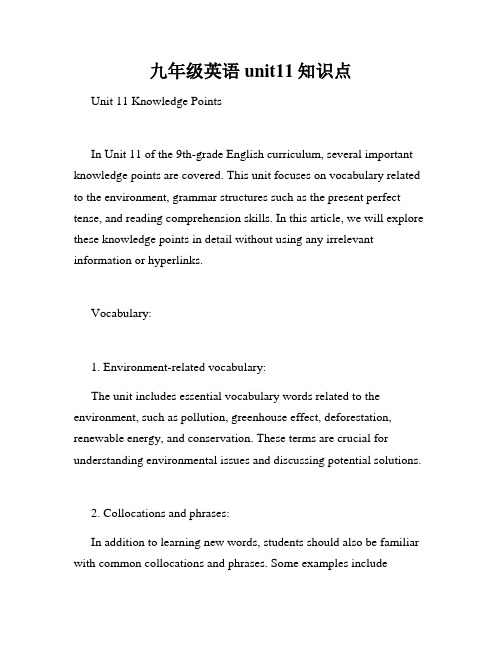
九年级英语unit11知识点Unit 11 Knowledge PointsIn Unit 11 of the 9th-grade English curriculum, several important knowledge points are covered. This unit focuses on vocabulary related to the environment, grammar structures such as the present perfect tense, and reading comprehension skills. In this article, we will explore these knowledge points in detail without using any irrelevant information or hyperlinks.Vocabulary:1. Environment-related vocabulary:The unit includes essential vocabulary words related to the environment, such as pollution, greenhouse effect, deforestation, renewable energy, and conservation. These terms are crucial for understanding environmental issues and discussing potential solutions.2. Collocations and phrases:In addition to learning new words, students should also be familiar with common collocations and phrases. Some examples includeenvironmental protection, carbon footprint, reduce waste, global warming, sustainable development, and alternative energy sources.Grammar:1. Present perfect tense:The present perfect tense is a fundamental grammar structure covered in Unit 11. It is formed by using the auxiliary verb "have/has" and the past participle of the main verb. This tense is used to connect the past and present, emphasizing the result or consequence of past actions. For example, "I have seen the movie" and "She has already finished her homework."2. Present perfect vs. past simple:A crucial aspect of the present perfect tense is understanding its distinction from the past simple tense. While the present perfect focuses on the experience and the impact on the present, the past simple indicates an action completed at a specific time in the past. For example, "I have been to France" (present perfect) vs. "I went to France last summer" (past simple).Reading Comprehension:1. Skimming and scanning:When reading texts in the English language, proficient comprehension skills are essential. Skimming is a technique used to quickly identify the main idea or topic of a passage, while scanning helps to locate specific information or key details. Developing these skills can significantly enhance reading comprehension.2. Context clues:Understanding context clues is crucial for grasping the meaning of unfamiliar words. By paying attention to surrounding words, expressions, or sentence structure, students can infer the meaning of unknown vocabulary without relying solely on a dictionary.In conclusion, Unit 11 of the 9th-grade English curriculum focuses on vocabulary related to the environment, the present perfect tense, and reading comprehension skills. Mastering these knowledge points will enable students to communicate effectively, understand environmental issues, and improve their overall language proficiency. By dedicating time and effort to learning and practicing these concepts, students can enhance their English language skills and become more confident communicators.。
人教版九年级英语Unit11单词、课文知识梳理,词汇句式精讲

人教版九年级英语Unit11单词、课文知识梳理/词汇句式精讲Unit11 单词the more …the more…越……越……leave out不包括;不提及;忽略friendship[frendʃip]n. 友谊;友情king[kiŋ]n. 君主;国王prime[praim]adj. 首要的;基本的minister[ministə(r)]n. 大臣;部长prime minister首相;大臣fame[feim]n. 名声;声誉pale[peil]adj. 苍白的;灰白的queen[kwi:n]n. 王后;女王examine[igzæmin]v.(.仔细地)检查;检验nor[nɔ:(r)]conj. & adv. 也不neither ... nor既不⋯⋯也不palace[pæləs]n. 王宫;宫殿powern. 权利;力量wealth[welθ]n. 财富;富裕grey[grei]a.阴沉的;昏暗的;灰色的lemon[lemən]n.柠檬[kænsl]v. 取消;终止weight [weit]n. 重量;分量shoulder [ʃəuldə(r)] n. 肩;肩膀goal[gəul]n. 球门;射门;目标coach[kəutʃ]n. 教练;私人教师kick[kik]v. 踢;踹teammate[ti:meit]n. 同队队员;队友courage[kʌridʒ]n. 勇敢;勇气rather[ra: ]adv. 宁愿;相当rather than而不是pull[pul]v. 拉;拖pull together齐心协力;通力合作relief[rili:f]n. 轻松;解脱nod[nɔd]v. 点头agreement[ əgri:mənt]n. (意见或看法)一致;同意fault[fɔ:lt]n. 过失;缺点disappoint [disəpɔint] v. 使失望Bert[bə:(r)t]伯特(男名)Holly[hɔli ]霍莉(女名)Unit11 知识梳理【重点短语】1. make me sleepy 使我困倦2. drive sb. crazy 使……发疯3. the more…,the more 越……越……4. yes and no 好坏参半5. be friends with sb. 是某人的朋友6. feel left out 感觉被忽视7. sleep badly 睡眠很差8. don’t feel like eating 不想吃东西9. for no reason 毫无理由10. neither…nor…既不……也不……11. let …down 使…...失望12. take one’s position 替代我的职位13. to start with 起初14. get the exam result back 取考试成绩单15. find out 发现16. remain unhappy forever 仍旧永远不幸福17. a shirt of a happy person 一件快乐人的衬衫【重点句型】1. --I’d rather go to Blue Ocean because I like to listen to quiet music while I’m eating.--But that music make me sleepy.--更愿意到蓝海洋餐厅,因为我喜欢在吃饭时听轻音乐。
九年级英语unit11全单元课文知识点详细讲解

Unit 11 Sad movies make me cry课文重难点详解Section A1. I’d rather go to Blue Ocean because I like to listen to quiet music while I’m eating.我宁愿去蓝色海洋餐馆,因为吃饭时我喜欢听点舒缓的音乐。
( 1c )【解析】’d rather 是would rather 的缩写形式,“宁愿;宁可;更喜欢”,后跟动词原形常用来表示选择的意愿。
没有人称和数的变化,其中would 常缩写成’d 形式【肯定句:would rather do sth. =prefer to do sth.I would rather stay at home because it’s cold outside.【2014四川达州】32. —Walking more is good for our health.—Y ou’re right. So I’d rather ____ a n hour’s walk to wor k than consider ______ a car.A. take; drivingB. take; driveC. take; to driveD. to take; driving 【2014江苏淮安】他过去常常整夜玩电脑游戏,但现在他宁愿把时间花在功课上也不上网了。
He _____________ play computer games all night, but now he _____________ spend his time on his lessons than on the Internet. [答案:used to , would rather]【否定句:would rather not do sth 宁愿不做某事( ) He would rather _______ to jazz.A. not listenB. not to listenC. not listeningD. listen not【疑问句:将would 提到句首Would you rather stay at home or play tennis with us?【拓展】would rather do sth than do sth(than 所连接的词语必须与前面的词语在词性和结构上保持一致I would rather ________(watch) TV at home than________(go) out for a walk.【2014湖北襄阳3】— Driving less, walking more is good for our health.— So I'd rather an hour's walk to work than consider a car.A. take, driveB. take, to driveC. take, drivingD. taking, driving=would do sth rahte than do sth=prefer to do sth. rather than do sth. 宁愿做某事而不愿做某事(表示在两者之间进行选择)【2014湖北孝感2】— What a heavy rain!— So it is. I prefer______ rather than _____ on such a rainy day.A. to go out; stay at homeB. to stay at home; go outC. going out; stay at homeD. staying at home ; go out2. But that music makes me sleepy. 但是那种音乐会让我昏昏欲睡。
英语人教版九年级全册unit11 Sad movies mad me sad
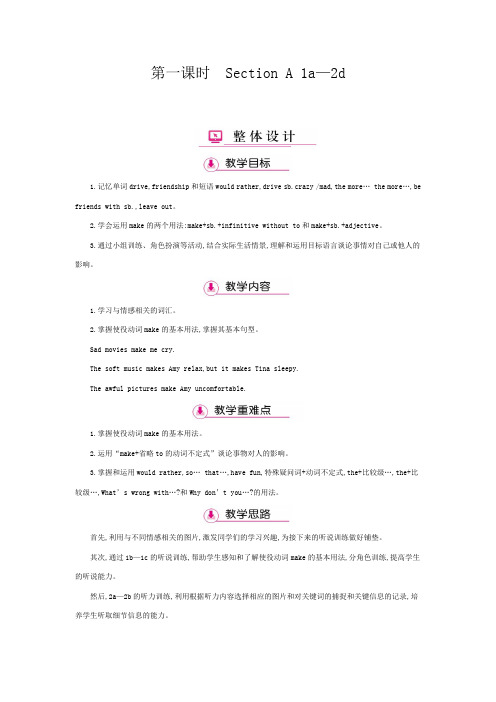
第一课时Section A 1a—2d1.记忆单词drive,friendship和短语would rather,drive sb.crazy /mad,the more… the more…,be friends with sb.,leave out。
2.学会运用make的两个用法:make+sb.+infinitive without to和make+sb.+adjective。
3.通过小组训练、角色扮演等活动,结合实际生活情景,理解和运用目标语言谈论事情对自己或他人的影响。
1.学习与情感相关的词汇。
2.掌握使役动词make的基本用法,掌握其基本句型。
Sad movies make me cry.The soft music makes Amy relax,but it makes Tina sleepy.The awful pictures make Amy uncomfortable.1.掌握使役动词make的基本用法。
2.运用“make+省略to的动词不定式”谈论事物对人的影响。
3.掌握和运用would rather,so… that…,have fun,特殊疑问词+动词不定式,the+比较级…,the+比较级…,What’s wrong with…?和Why don’t you…?的用法。
首先,利用与不同情感相关的图片,激发同学们的学习兴趣,为接下来的听说训练做好铺垫。
其次,通过1b—1c的听说训练,帮助学生感知和了解使役动词make的基本用法,分角色训练,提高学生的听说能力。
然后,2a—2b的听力训练,利用根据听力内容选择相应的图片和对关键词的捕捉和关键信息的记录,培养学生听取细节信息的能力。
最后,利用听力部分输入的信息进行会话交流,实现对目标语言的输出;深入学习2d的示范对话,帮助学生围绕Feelings话题进一步交流,完成教学目标。
上课所需要的实物或图片,教学PPT,录音机,磁带和多媒体。
人教版英语九年级全册 Unit 11 Sad movies make me cry
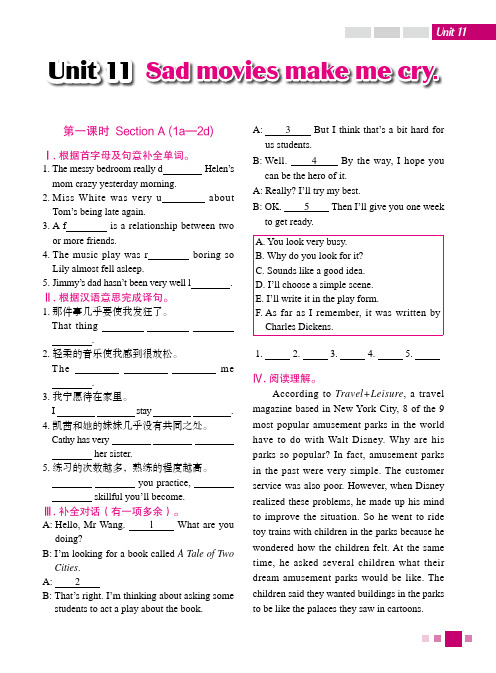
1第一课时 Section A (1a—2d)Ⅰ. 根据首字母及句意补全单词。
1.T Helen’s mom crazy yesterday morning.2.M iss White was very u about Tom’s being late again.3.A f is a relationship between two or more friends.4.T he music play was r boring so Lily almost fell asleep.5.J immy’s dad hasn’t been very well l .Ⅱ. 根据汉语意思完成译句。
1. 那件事几乎要使我发狂了。
T hat thing .2. 轻柔的音乐使我感到很放松。
The me .3. 我宁愿待在家里。
I stay .4. 凯茜和她的妹妹几乎没有共同之处。
C athy has very her sister.5. 练习的次数越多,熟练的程度越高。
you practice, skillful you’ll become.Ⅲ. 补全对话(有一项多余)。
A:H ello,Mr Wang. 1 What are you doing?B:I’m looking for a book called A Tale of Two Cities.A: 2 B:T hat’s right. I’m thinking about asking some students to act a play about the book.A: 3 But I think that’s a bit hard for us students.B:W ell. 4 By the way, I hope you can be the hero of it.A:R eally? I’ll try my best.B:O K. 5 Then I’ll give you one week to get ready.A. You look very busy.B. Why do you look for it?C. Sounds like a good idea.D. I’ll choose a simple scene.E. I’ll write it in the play form.F.A s far as I remember, it was written byCharles Dickens.1. 2. 3. 4. 5.Ⅳ. 阅读理解。
人教版九年级英语第十一单元知识点总结

人教版九年级英语第十一单元知识点总结Unit 11: Sad Movies Make Me Cry - Summary of Vocabulary1.Words: rather。
would rather。
drive。
drives sb crazy/mad。
the more。
the more。
lately。
be friends with sb。
leave out。
friendship。
king。
power。
prime minister。
banker。
fame。
pale。
queen。
call in。
examine。
nor。
neither。
nor。
palace。
wealth。
to start with。
grey。
lemon。
fortable。
weight。
shoulder。
goalie。
let。
down。
coach。
kick。
kicks。
off。
be hard on sb。
beside。
teammate。
courage。
rather than。
guy。
pull。
pull together。
relief。
nod。
agreement。
fault。
disappoint.2.Rather is an adverb that can modify adjectives and their comparative forms。
as well as a little。
much。
a bit。
even。
and still。
Note that adverbs can modify verbs。
adjectives。
and other adverbs.3.The phrase "prefer to do sth rather than do sth" can be expressed in us ways。
such as "prefer doing sth to (doing) sth,""would rather do sth than do sth," and "would do sth rather than do sth." For example。
人教版九年级英语第十一单元知识点汇总

人教版九年级英语第十一单元知识点汇总Unit 11 Sad Movies Make Me CryHave you ever XXX。
I have。
When I was in high school。
I watched a movie called "A Walk to Remember." The movie is about a teenage girl who befriends with a boy and they fall in love。
However。
the girl has a terminal illness。
and the boy must waitfor her to pass away。
The movie is filled with sad moments。
and the XXX.Some people might wonder why anyone would want to watch a sad movie。
For me。
it's about the XXX deeply。
and I appreciate that。
I find that when I watch a sad movie。
I can XXX。
It's like the movie is a mirror。
and I can see myself XXX.Of course。
not everyone feels the same way。
Some people prefer to watch movies with loud music and n scenes。
They wantto be entertained。
not saddened。
That's okay。
too。
We all have different XXX is better than the other.What makes a movie sad。
人教版九年级英语全册 Unit 11 Sad movies make me cry知识清单
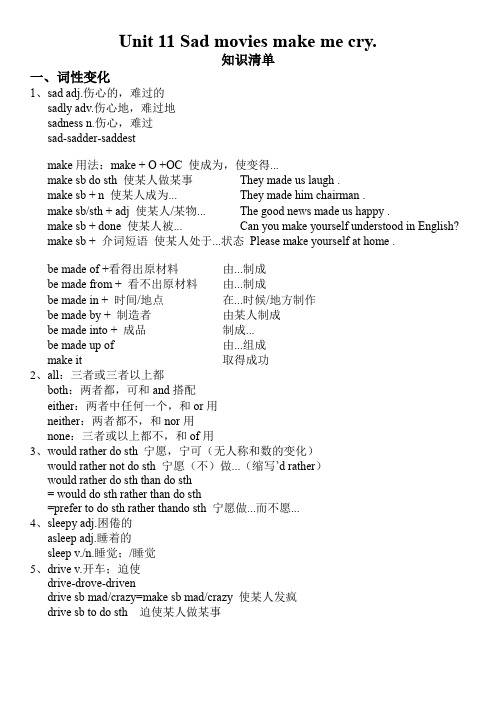
Unit 11 Sad movies make me cry.知识清单一、词性变化1、sad adj.伤心的,难过的sadly adv.伤心地,难过地sadness n.伤心,难过sad-sadder-saddestmake用法:make + O +OC 使成为,使变得...make sb do sth 使某人做某事They made us laugh .make sb + n 使某人成为...They made him chairman .make sb/sth + adj 使某人/某物...The good news made us happy .make sb + done 使某人被...Can you make yourself understood in English?make sb + 介词短语使某人处于...状态Please make yourself at home .be made of +看得出原材料由...制成be made from + 看不出原材料由...制成be made in + 时间/地点在...时候/地方制作be made by + 制造者由某人制成be made into + 成品制成...be made up of 由...组成make it 取得成功2、all:三者或三者以上都both:两者都,可和and搭配either:两者中任何一个,和or用neither:两者都不,和nor用none:三者或以上都不,和of用3、would rather do sth 宁愿,宁可(无人称和数的变化)would rather not do sth 宁愿(不)做...(缩写’d rather)would rather do sth than do sth= would do sth rather than do sth=prefer to do sth rather thando sth 宁愿做...而不愿...4、sleepy adj.困倦的asleep adj.睡着的sleep v./n.睡觉;/睡觉5、drive v.开车;迫使drive-drove-drivendrive sb mad/crazy=make sb mad/crazy 使某人发疯drive sb to do sth 迫使某人做某事6、be sure of/about 对...有把握;确信be sure to do sth 务必/切记要做某事7、have...in common 有共同之处have nothing in common 没有共同点have one thing in common 有一个共同点8、lately adv.最近;不久前latest adj./n.最新的;最近的;/最新的东西later adv.过后,稍后late adj.晚的(be late for 迟到);adv.晚地;迟地9、Be friends with sb 成为某人的朋友Make friends with sb 与某人交朋友10、Ask sb not to do sth 要求某人不要做某事Ask sb for help 向某人寻求帮助11、why don’t you do sth ? = why not do sth ? 为什么不...12、feel left out 觉得被遗忘;觉得被忽略;觉得被冷落leave out 忽略;不考虑;省去13、be friendly to 对...友好Friendship n.友谊Friend n.朋友A friend in need is a friend indeed . 患难见真情.14、feel like doing sth = want to do sth =would like to do sth 想要做某事15、be pale as chalk 像粉笔一样苍白16、for no reason 无缘无故地17、call in召来18、examine v.仔细地检查examination n.检查19、neither...noreither...ornot only...but alsothere/here benot...butboth...and20、Power n.权利(不可数);力量Powerful adj.有权势的Knowledge is power .知识就是力量.21、be worried about = be concerned about为...担心Worry about 为...焦虑/担心22、have nothing wrong with 没有什么事情have something wrong with 有事情23、situation n.情况;处境24、try to do sth 尽力做某事try doing sth 尝试做某事25、take one’s position 取代位置26、Wealth n.财富(不可数)Wealthy adj.富裕的Health n.健康Healthy adj.健康的27、It’s true that 确实;的确28、follow sb to do sth 跟着某人做...following adj.以下的29、top general 高级将领30、Hand back 归还31、Search for 寻找32、The winning team 胜利之队33、Keep one’s eyes on 盯34、Ground n.地面35、to start with 起初;开始start with=begin with 以...开始end with 以...结束36、comfortable adj.使人舒服的comfortably adv.舒服地uncomfortable adj.使人不舒服的uncomfortably adv.使人不舒服地37、Me too .=So+be/助/情+主语“...也是”38、tell sb (not)to do sth 告诉某人(不)做某事39、remain 停留40、It takes sb time to do sth 做某事花费某人多长时间41、Weight n.重量;分量Weigh v.称...重量a heavy weight on one’s shoulders 双肩沉重the weight of ...的重量Put on weight 增肥Lose weight 减肥42、On one’s shoulders 在某人的双肩上Shoulder to shoulder 肩并肩43、miss v.错过;想念miss doing sth 错过做某事44、Score n.球门;目标;分数get good scores on 在...取得好成绩score a goal 进球45、Coach n.教练(可数);(复数coaches);v.指导;训练46、Kick v./n.踢;踹kick sb off =kick sb out of 开除某人47、Hear sb doing sth 听见某人正在做某事(正在进行)hear sb do sth 听见某人做某事(全过程)48、Let sb in = let sb come in 让某人进入49、be too hard on sb 对某人太苛刻50、Make sb think carefully 陷入沉思51、Support v./n.支持;承受support sb in sth 在某方面支持某人52、Besides 除...之外(还有...);包含在内Besides milk ,we need vegetable.except 除...之外(没有);排除在外We are all here except/but Tom.except for 除...之外;肯定整体,否定部分细节He is a good man except for his bad temper .but 除...之外,和except 用法基本相同,强调整句的内容,习惯上用no,nothing,anything等词之后.53、communicate v.交流communication n.交流communicate with sb 与某人交流/沟通54、Learn from 向...学习55、the next day 第二天(与一般过去时连用)next day = tomorrow 明天(与一般将来时连用)56、Courage n.勇气lose courage 失去勇气take courage 鼓起勇气57、Be close to 几乎处于某种状态;很快就要做某事;离...近58、Pull together 齐心协力59、Relief n.轻松;解脱;;宽慰;宽心to one’s relief 令某人放心/安心的是60、Nod v.点头;打盹nod-nodded-nodded-noddingnod one’s head 点头61、agreement n.一致;同意disagreement n.分歧agree v.同意disagree v.不同意in agreement with 同意;与...一致in agreement 意见一致62、put pressure on 施压;给...压力63、fault n.过失;缺点(性格上的)faulty adj.有缺点的;不完美的64、Offer v.自愿给予;主动提出;提供offer sb sth = offer sth to sb 给某人提供某物offer to do sth 主动提出做某事65、disappoint v.使失望=let sb downdisappointing adj.令人失望的(物)disappointed adj.失望的(人)disappointment n.失望be disappointed with 对...失望66、get into a fight with 和...打架。
人教版九年级英语unit11知识点归纳
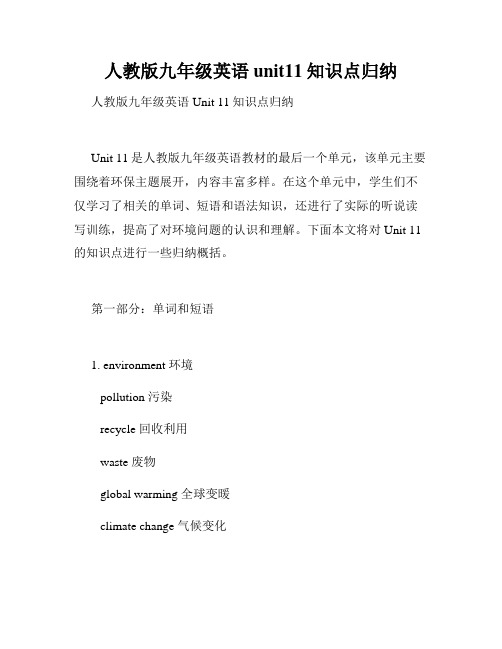
人教版九年级英语unit11知识点归纳人教版九年级英语Unit 11知识点归纳Unit 11是人教版九年级英语教材的最后一个单元,该单元主要围绕着环保主题展开,内容丰富多样。
在这个单元中,学生们不仅学习了相关的单词、短语和语法知识,还进行了实际的听说读写训练,提高了对环境问题的认识和理解。
下面本文将对Unit 11的知识点进行一些归纳概括。
第一部分:单词和短语1. environment 环境pollution 污染recycle 回收利用waste 废物global warming 全球变暖climate change 气候变化这些单词和短语是本单元的核心内容,学生们要学会运用它们来描述和谈论环境问题。
2. rubbish 垃圾plastic bags 塑料袋energy-saving 节能的power station 发电站endangered species 濒危物种这些单词和短语是围绕环境问题展开的,学生们需要了解并掌握它们的意思和用法。
第二部分:语法1. 一般现在时一般现在时用于表达经常性的动作、习惯或客观真理。
例如:Water boils at 100 degrees Celsius.2. 一般过去时一般过去时用于表示过去发生的事情或已经结束的状态。
例如:I visited my grandparents last summer.3. 被动语态被动语态用于强调动作的承受者而不是执行者。
例如:The book was written by a famous author.学生们需要注意动词的时态和被动语态的变化规则,以便正确地运用它们。
第三部分:听说读写1. 听力训练听力训练包括听对话和短文以及回答相关问题。
学生们需要通过听力训练提高听力理解能力和获取信息的能力。
2. 口语表达口语表达包括通过对话和演讲等形式,进行实际的口头交流。
学生们需要勇于开口,积极参与口语练习,提高口语表达和交流能力。
Unit 11 基础知识讲解 人教版英语九年级全册

九年级Unit 11: Sad movies make me cry.一、“make + 宾语+宾补”的用法make 表示“使,让”时,为使役动词;常构成make + 宾语+ 宾语补足语的结构;其中,宾语补足语可由多种词性构成;1、make + 宾语+不定式(考查重点)主动语态:make sb. do sth. “让某人做...”省略不定式to;被动语态:be made to do sth. “...被迫做...”还原不定式to;My teacher made me finish the homework in an hour. 老师让我在一小时内完成作业。
I was made to finish the homework in an hour. 我被迫在一小时内完成作业。
2、make + 宾语+形容词(考查重点)Tom is funny and he always makes us happy. 汤姆很有趣,他总是让我们高兴。
The internet makes our life more convenient. 互联网使我们的生活更方便。
3、make + 宾语+名词We all agreed to make Sam our leader. 我们都同意让Sam 当我们的领袖。
4、make + 宾语+过去分词当过去分词做宾语补足语时,过去分词与宾语之间存在被动关系;“让...被...”;通常此时的宾语为反身代词Mr. Black speaks loud to make himself heard in the class.布莱克先生大声说话,使自己在课堂上听得见。
(让自己被听见)5、make + it + adj. + to do sth. (考查重点)此句型中it 为形式宾语,真正的宾语为to do sth;In order to make it easier to remember the words, Jenny decides to make some word cards.为了记忆单词更容易,珍妮决定制作一些词卡。
人教版九年级英语Unit 11课本知识点集锦

九年级英语Unit 11 Sad movies make me cry.课本知识点集锦P81☆make sb. do sth. 使某人做某事make me cry/relax使我哭/放松☆would rather do sth. 宁愿做某事☆make sb. +形容词(uncomfortable/sleepy/nervous) 让某人……(不舒服的/困倦/紧张的)P82☆drive sb. crazy / mad 使人发疯/发狂☆so ... that ... 如此……以致……☆have fun 玩得愉快/开心☆yes and no 是也不是;既开心又不开心☆the more... the more... 越……越……☆get to know 渐渐了解☆have a lot in common 有许多共同之处☆be friends with sb. 成为某人的朋友☆Why don’t you do sth.? = Why not do sth.?为什么不……?☆leave out 忽略;不提及;不包括feel left out 觉得被冷落P83☆There be/live/appear/lie/stand... .☆a long time ago 很久以前☆feel like doing sth. 想做某事☆for no reason 没理由,无缘无故☆call in 召来;叫来☆be all in one’s mind 只是凭空想象☆neither ... nor ... 既不……也不……☆explain ...to sb. 向某人解释☆be worried about 担心☆take one’s position 取代某人的位置☆It’s true that+从句☆top general 高级将领☆go out 出去☆in three days’ time 三天时间后P84☆to start with 起初;开始时☆get sth. back 取回;回来;恢复☆hand back 交还;归还☆find out 查明;找出;弄清楚☆buy sb. sth. = buy sth for sb. 给某人买某物☆clean up 清理;打扫P85☆remain unhappy 依然不开心☆search for 搜寻☆even though 即使P86☆keep one’s eyes on 盯着;留神;警惕☆feel like 想要☆think about 思考☆miss doing sth. 错过/ 怀念做某事;没做成某事☆let ... down 使失望☆because of 由于;因为☆kick sb. off 开除某人☆as soon as 一……就……☆hear sb. doing sth. 听见某人正在做某事☆knock on 敲击(门、窗等)☆be hard on sb. 对某人苛刻;对某人要求严厉☆communicate with 与……交流☆learn from 向……学习☆the next day 第二天☆rather than 而不是☆be close to 接近☆continue to do sth. 继续做某事☆pull together 齐心合力;通力合作☆to one’s surprise 使某人惊讶的是☆in agreement 意见一致P87☆agree with sb. 同意某人(的意见、观点等)☆put pressure on sb. 给某人施加压力。
- 1、下载文档前请自行甄别文档内容的完整性,平台不提供额外的编辑、内容补充、找答案等附加服务。
- 2、"仅部分预览"的文档,不可在线预览部分如存在完整性等问题,可反馈申请退款(可完整预览的文档不适用该条件!)。
- 3、如文档侵犯您的权益,请联系客服反馈,我们会尽快为您处理(人工客服工作时间:9:00-18:30)。
人教版九年级英语Unit11单词、课文mp3/知识梳理/词汇句式精讲Unit11 单词the more …the more…越……越……leave out不包括;不提及;忽略friendship[frendʃip]n. 友谊;友情king[kiŋ]n. 君主;国王prime[praim]adj. 首要的;基本的minister [ministə(r)]n. 大臣;部长prime minister首相;大臣fame[feim]n. 名声;声誉pale[peil]adj. 苍白的;灰白的queen[kwi:n]n. 王后;女王examine[igzæmin]v.(.仔细地)检查;检验nor[nɔ:(r)]conj. & adv. 也不neither ... nor既不⋯⋯也不palace[pæləs]n. 王宫;宫殿power[pauə(r)]n. 权利;力量wealth[welθ]n. 财富;富裕grey[grei]a.阴沉的;昏暗的;灰色的lemon[lemən]n.柠檬cancel[kænsl]v. 取消;终止weight[weit]n. 重量;分量shoulder[ʃəuldə(r)]n. 肩;肩膀goal[gəul]n. 球门;射门;目标coach[kəutʃ]n. 教练;私人教师kick[kik]v. 踢;踹teammate[ti:meit]n. 同队队员;队友courage[kʌridʒ]n. 勇敢;勇气rather[ra: ]adv. 宁愿;相当rather than而不是pull[pul]v. 拉;拖pull together齐心协力;通力合作relief[rili:f]n. 轻松;解脱[nɔd]v. 点头agreement[ əgri:mənt]n. (意见或看法)一致;同意fault[fɔ:lt]n. 过失;缺点disappoint[disəpɔint]v. 使失望Bert[bə:(r)t]伯特(男名)Holly霍莉(女名)Unit11 知识梳理【重点短语】1. make me sleepy 使我困倦2. drive sb. crazy 使……发疯3. the more…,the more 越……越……4. yes and no 好坏参半5. be friends with sb. 是某人的朋友6. feel left out 感觉被忽视7. sleep badly 睡眠很差8. don’t feel like eating 不想吃东西9. for no reason 毫无理由10. neither…nor…既不……也不……11. let …down 使…...失望12. take one’s position 替代我的职位13. to start with 起初14. get the exam result back 取考试成绩单15. find out 发现16. remain unhappy forever 仍旧永远不幸福17. a shirt of a happy person 一件快乐人的衬衫【重点句型】1. --I’d rather go to Blue Ocean because I like to listen to quiet music while I’m eating.--But that music make me sleepy.--更愿意到蓝海洋餐厅,因为我喜欢在吃饭时听轻音乐。
--但那种音乐使我困倦。
2. Waiting for Amy drove Tina crazy.等候艾米使蒂娜发狂。
3.The movie was so sad that it made Tina and Amy cry.这部电影是如此悲伤以致使蒂娜和艾米都哭了。
4.Sad movies don’t make John cry. They just make him want to leave quickly.悲伤的电影没有让约翰哭他们只能使他想尽快离开。
5.Loud music makes me nervous.吵闹的音乐使我紧张。
6.Soft and quiet music makes me relax.轻柔的音乐使我放松。
7.Money and fame don’t always make people happy.金钱和名誉并不总能使人幸福。
8.She said that the sad movie made her cry.她说悲伤的电影使她哭泣。
9.Loud music makes me nervous.吵闹的音乐使我紧张。
词汇精讲1. rather(1)rather意为“相当,有点”,与would连用,即would rather意为“宁愿……”,表示句子主语的愿望、选择,后接省去to的不定式。
例如:He’d rather join in the English group.他宁愿加入到英语小组中来。
Which would you rather have,bread or rice?面包和米饭,你更喜欢哪一个?(2)如果表示“宁愿(可)……也不愿……”则用句型would rather...than...。
在would rather和than后面所连接的两个对比部分一般要保持一致,常用动词原形。
例如:The brave soldier would rather die than give in.那个勇敢的士兵宁死不屈。
He’d rather work than play.他宁愿工作也不愿玩。
2. start with(1)start with作“首先”解时,只用于动词不定式,在句中常常以插入语的形式出现。
例如:To start with, the computer room must be kept very clean.首先,计算机工作室必须保持清洁。
Our group had five members, to start with.刚开始,我们小组只有五个人。
(2)start with可表示“从……开始;先从某事做起”,与begin...with是同义词组。
反义词组是end with“以……结束”。
例如:The meeting ended with a speech given by the chairman.会议以主席的讲话结束。
He wanted to start/begin with the smallest country and end with the largest one.他打算先去最小的国家,最后去最大的国家。
(3)start单独使用时,意为“开始”,可用作及物动词或不及物动词。
用作及物动词时,其后跟名词、代词,也可跟动词不定式或动名词形式。
begin是start 的同义词,两者在用法上没有很大差别,只是start侧重动作的突然开始。
例如:As soon as we got there, it started raining.我们一到那儿就下雨了。
When did we start/begin this lesson?我们是什么时候开始讲这一课的?3. hard和hardlyhardly和hard形式上很接近,但意义截然不同。
(1)hard作形容词时,意为“困难的;硬的;勤奋的;严厉的;苛刻的”。
hard作副词时常用来表示程度,意为“努力地;猛烈地;剧烈地”。
例如:This ground is too hard to dig. 这块地太硬,挖不动。
I work hard at school. 我在学校努力学习。
They tried hard to succeed. 他们努力工作,以求得成功。
【拓展】hard组成的常见词组有:work hard at…“努力于……”;(hard作副词)be hard on sb. 对某人苛刻;对某人要求严厉。
(hard作形容词)。
例如:He is working hard at English. 他正在努力学习英语。
A good boss knows when to be hard on his employees.一个精明的老板知道何时应对员工严格要求。
(2)hardly是表频率的副词,意为“几乎不;几乎没有”,相当于almost not,并非hard的副词形式。
例如:There is hardly any coffee left. = There’s almost no coffee left.几乎没有剩余的咖啡了。
4. feel like(1)“感觉像……,摸起来像……”。
例如:I feel like a child. 我感觉自己像个小孩子。
(2)“想要……”。
后接代词、名词或动名词。
例如:Do you feel like some fish for supper? 晚饭你想吃些鱼吗?I feel like doing something different today.我今天想要做点别的事情.(3)It feels like…句型可用来表示天气、时间等,意为“好像要……,似乎是……”。
例如:It feels like tea time. 好像喝茶的时间到了。
【拓展】feel like; would like与want的辨析:三者都可表示“想要做某事”。
其用法分别如下:(1)feel like后接名词、代词或动名词,构成feel like doing sth.。
例如:I don’t feel like eating. 我不想吃东西。
(2)wouldlike后接名词、代词或不定式。
构成would like to do sth.。
例如:What would you like to do now? 你现在想做什么?(3)want后可接名词或不定式,构成wantto do sth.。
例如:Do you want to join us? 你想加入到我们中吗?5. let…down(1)意为“使…失望或沮丧”。
例如:The team felt that they had let the coach down.队员们觉得他们让教练失望了。
He won’t let you down;he’s very reliable.他不会让你失望的,他很靠得住。
(2)意为“放下”。
例如:Pleaselet down the blinds.请把百叶窗放下。
(3)意为“慢下来;松懈”。
例如:The horse let down near the end of the race and lost.那匹马在近终点时慢了下来,所以输了。
Don’t let down even if the going is good.即使在顺利的情况下也不要松劲。
